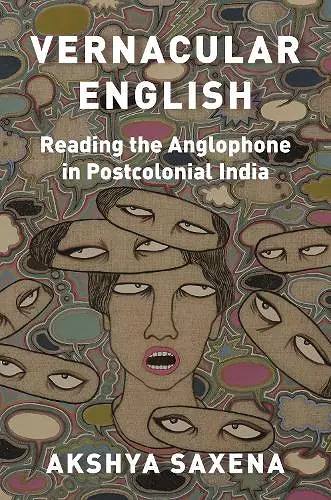Vernacular English
Reading the Anglophone in Postcolonial India
Format:Paperback
Publisher:Princeton University Press
Published:21st Mar '22
Currently unavailable, and unfortunately no date known when it will be back
This paperback is available in another edition too:
- Hardback£88.00(9780691219981)

This book examines the political significance of English in India, highlighting its role as a language of empowerment for marginalized communities. Vernacular English redefines our understanding of language.
In Vernacular English, Akshya Saxena explores the complex role of the English language in India, revealing its dual nature as both a tool of the state and a means of resistance. Contrary to the prevailing narrative that views English as a remnant of colonial oppression, Saxena argues that, in the context of a postcolonial democracy, it has evolved into a language of the people. This compelling analysis spans three centuries of English literature and media in India, showcasing how English has been embraced by various social groups, particularly those from low castes and minority ethnic backgrounds, to assert their voices against the state.
The book delves into a rich tapestry of texts from English and Hindi literature, law, film, and visual art, presenting a nuanced understanding of how English has been utilized in public protests and everyday life. Saxena highlights lesser-known debates and practices that have shaped the perception and usage of English, including the historical legislation surrounding the language in India. By focusing on the sensory experiences associated with English—hearing, touching, remembering, speaking, and seeing—Vernacular English offers a fresh perspective on the political and cultural significance of the language.
Ultimately, this work challenges the conventional view of English as merely a global lingua franca. It invites readers to reconsider the essence of language itself and the frameworks through which we analyze linguistic phenomena. Vernacular English is not just an academic inquiry; it is a call to rethink the implications of language in a diverse society.
"Shortlisted for the ASAP Book Prize, Association for the Arts of the Present"
"Winner of the First Book Prize, Modern Language Association"
"In a country where English literature departments refer to all other Indian languages as 'vernacular'—or, tautologically, as 'bhasha,' for 'bhasha' means language—Saxena’s book is a necessary and significant counterpoint to this discourse, showing how the vernacularization of the English language has affected India’s political life. . . . Vernacular English is a timely, necessary, and original book."---Sumana Roy, Los Angeles Review of Books
"Saxena stretches out her net to bring in not just everyday Indians but all those assailed by a brutal state and needing a medium to express their pain."---Peggy Mohan, The Wire
"
The focus on a vast and understudied archive, nuanced textual readings, and sustained attention to the sensory modes of engaging with language allows [Vernacular English] to prise open the political and affective terrains of English in India.
"---Navaneetha Mokkil, South Asia"Saxena’s study of different domains toward the co-optation of English as an instrument of empowerment makes the concept of ‘Vernacular English’ a good alternative to the accepted mindset that English is a language of the elites in India."---Soni Wadhwa, Asian Review of Books
"One of the most fascinating studies on translation andextra-translational ways of perception. . . . Saxena succeeds to offer a relatively deeper and fresher view on theconstruction of the Anglophone that has lately become a homogenous term for global politics."---Ayan Chakraborty, Journal of Comparative Literature and Aesthetics
"A notable addition to existing historical, cultural, and literary scholarship that problematises the singularity of the English language and pays attention to the blurriness between the local and the global."---Shwetha Chandrashekhar, South Asian History and Culture
"Vernacular English . . . is crucial scholarship in the continuing resilience of the perspectives afforded by researching postcoloniality beyond the strict space-time of historical colonialism"---Saronik Bosu, Cambridge Journal of Postcolonial Inquiry
"Fortified by academic soundness, rich references and a peek into how women, like her own mother, use English, Saxena’s maiden attempt is a marvellous read for those who are intrigued by the status of English in India."---Vani Krishnan, South Asia Research
ISBN: 9780691223131
Dimensions: unknown
Weight: unknown
232 pages